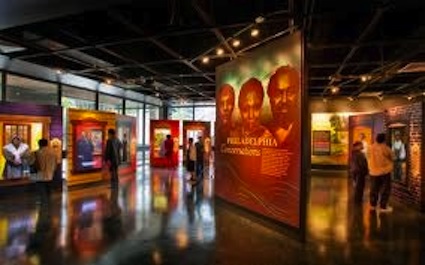
“Audacious Freedom”: Looking back at American freedom fighters
By Adrienne Whaley, The African American Museum in Philadelphia
As the Martin Luther King, Jr National Memorial prepares for its official debut, now is a perfect time to look back on some of the other freedom fighters who have significantly impacted our country. Many people do not know that for a time in the late 18th and early 19th century, Philadelphia was home to a large and thriving population of free Africans and African American, so much a center of black life that it was considered the center of black life above the Mason Dixon Line. Here, men and women of African descent worked side by side through political, social, educational, religious organizations, and more, to carve out meaningful lives for themselves and their families and to actively fight slavery, racism and discrimination at a time when slavery loomed not just as a historical specter, but as a grim reality of life.
It is this community of individuals that our exhibit, Audacious Freedom: African Americans in Philadelphia, 1776-1876, attempts to shed new light on.
What does it mean to be audacious? To be bold, fearless, daring in the face of danger. Action words for a swashbuckler, perhaps, but how else to explain local conductors of the Underground Railroad like Henrietta Bowers Duterte, a female undertaker who hid freedom seekers in coffins and funeral processions to transport them undetected across the city? Or Richard Allen and Absalom Jones, who, rather than accept an inferior position for blacks in integrated churches, decided to open their own religious institutions despite church opposition? Or James Forten, a sailmaker who had amassed so much money operating his (integrated!) business that he was able to pay lawyers to rescue his kidnapped nephew from being sold into slavery? Not to mention Octavius Catto and Caroline LeCount, who were fighting to desegregate streetcars in Philadelphia a century before King and Rosa Parks!
Not every individual had the resources of an Allen or a Duterte, a Forten or a Catto, nor the temperament to so publicly decry the horrors and injustices of their time. But this is, in part, what made Philadelphia’s black community so strong: there were many people each working in their own small ways – in their families, in their businesses, social organizations, schools, and churches – to make their community stronger. Many of their names have been lost to time, but without their support, much of what the Joneses – and for that matter, Kings – of the world would not have been possible.
So, today, we are excited for the opening of the King Memorial – during the presidency of an African American, no less! – but we have a question for you: how audacious are you prepared to be in the cause for equal rights?
Recent Content
-
Artsarticle ·
-
Artsarticle ·
-
Artsarticle ·

